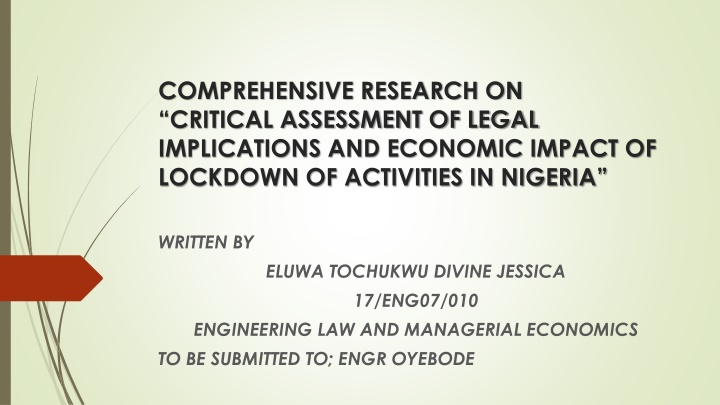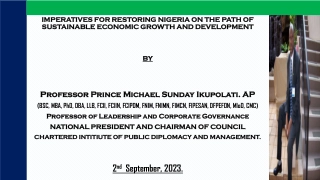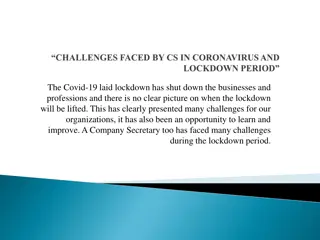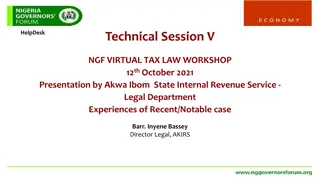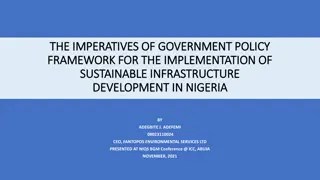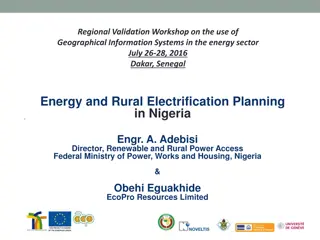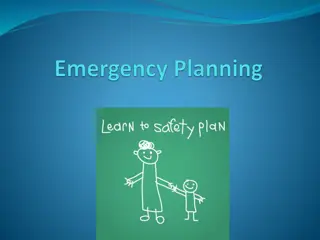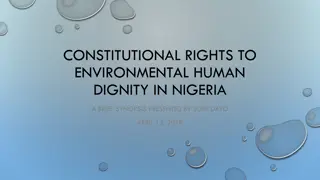Critical Assessment of Lockdown Implications in Nigeria: Economic Impact & Legal Analysis
Amid the COVID-19 pandemic, Nigeria implemented a lockdown to curb the spread of the virus. This research delves into the legal implications and economic impact of the lockdown on activities in Nigeria, exploring various sectors such as the oil and gas industry and aggregate demand. It discusses the challenges faced by the country and analyzes the measures taken to mitigate the effects of the lockdown.
Download Presentation

Please find below an Image/Link to download the presentation.
The content on the website is provided AS IS for your information and personal use only. It may not be sold, licensed, or shared on other websites without obtaining consent from the author.If you encounter any issues during the download, it is possible that the publisher has removed the file from their server.
You are allowed to download the files provided on this website for personal or commercial use, subject to the condition that they are used lawfully. All files are the property of their respective owners.
The content on the website is provided AS IS for your information and personal use only. It may not be sold, licensed, or shared on other websites without obtaining consent from the author.
E N D
Presentation Transcript
COMPREHENSIVE RESEARCH ON CRITICAL ASSESSMENT OF LEGAL IMPLICATIONS AND ECONOMIC IMPACT OF LOCKDOWN OF ACTIVITIES IN NIGERIA WRITTEN BY ELUWA TOCHUKWU DIVINE JESSICA 17/ENG07/010 ENGINEERING LAW AND MANAGERIAL ECONOMICS TO BE SUBMITTED TO; ENGR OYEBODE
What is a coronavirus? According to the WHO, Coronaviruses are a large family of viruses which may cause illness in animals or humans. In humans, several coronaviruses are known to cause respiratory infections ranging from the common cold to more severe diseases such as Middle East Respiratory Syndrome (MERS) and Severe Acute Respiratory Syndrome (SARS). The most recently discovered coronavirus causes coronavirus disease COVID-19. COVID-19 is the infectious disease caused by the most recently discovered coronavirus. This new virus and disease were unknown before the outbreak began in Wuhan, China, in December 2019
What are the symptoms of COVID-19? The most common symptoms of COVID-19 are fever, tiredness, and dry cough. Some patients may have aches and pains, nasal congestion, runny nose, sore throat or diarrhea. These symptoms are usually mild and begin gradually. Some people become infected but don t develop any symptoms and don't feel unwell. Most people (about 80%) recover from the disease without needing special treatment.
CRITICAL ASSESSMENT OF THE LOCKDOWN OF ACTIVITIES IN NIGERIA Nigeria is one of many countries to shut down economic activities to prevent the rapid spread of the coronavirus pandemic. Most, especially developed nations, have implemented economic support measures to mitigate the impact of lockdowns on their economies.
IMPACT IN THE OIL AND GAS INDUSTRY Oil price crash; One important impact of the coronavirus outbreak on the downstream oil industry is that the price of crude oil has fallen significantly in a short time, taking billions off the stock prices of major oil and gas companies. Demand drops; As demand decreases in Europe and the US, China is hoping to restore production. However, in its monthly report, the International Energy Agency predicted an annual decrease in demand of 90,000 barrels per day, the largest fall in a decade.
IMPACT ON AGGREGATE DEMAND In Nigeria, efforts were already being made to bolster aggregate demand through increased government spending and tax cuts for businesses. The public budget increased from 8.83 trillion naira ($24.53 billion) in 2019 to 10.59 trillion naira ($29.42 billion) in 2020 Unfortunately, the COVID-19 crisis is causing all components of aggregate demand, except for government purchases, to fall
CRITICAL ASSESSMENT OF THE LEGAL IMPLICATIONS CAUSED BY THE LOCKDOWN OF ACTIVITIES IN NIGERIA The various responses to COVID-19 worldwide (particularly in the most affected economies) have either crippled the operations or adversely affected the international value chain for companies products. We have considered a few enterprises/contractual arrangements below: Financing Employment Aviation, Shipping & Logistics Tourism & Entertainment Construction & Mining Healthcare African Trade.
POSSIBLE SOLUTIONS Force Majeure; Most commercial agreements contain force majeure clauses, included to protect the positions of parties to such agreements, in case certain events (defined in the agreement) occur to prevent performance of contractual obligations. Such circumstances usually include natural disasters, otherwise known as "acts of god", such as earthquakes, tsunamis, plagues or "serious epidemic". Force majeure events can also include "acts of man" which are reasonably unforeseeable and disruptive in nature, such as an industrial action.
POSSIBLE SOLUTIONS Insurance Policy; Commercial entities having "All-Risks Insurance" and "Special Perils Insurance" as well as "Consequential Loss Insurance" and the like, should review the terms of such policies or seek appropriate professional advice, on whether the current Coronavirus scourge could be accommodated in the risks insured against.
POSSIBLE SOLUTIONS Business Continuity Plan; The COVID-19 pandemic is changing the world of work. For enterprises without a contingency plan, the economic adverse effect of the pandemic could be extremely devastating. In view of present realities, commercial entities should invest in system automation whereby services can be provided remotely to their clients or customers, in times of natural disasters, widespread plaques or lockdown. For entities relying on delivery of services, the inclusion of provisions in the contract obliging the service provider to have a robust business continuity plan will be important.
CONCLUSION We encourage African businesses affected by coronavirus to consider and institute some of the measures recommended in this material and engage legal counsel to ensure legally compliant strategies. Businesses should keep up to date with all news and insights during COVID-19 and order their engagements accordingly as we all assess the scale and impact of this outbreak on African businesses and global markets.
PLEASE STAY SAFE AND WISHING YOU A HAPPY EASTER
